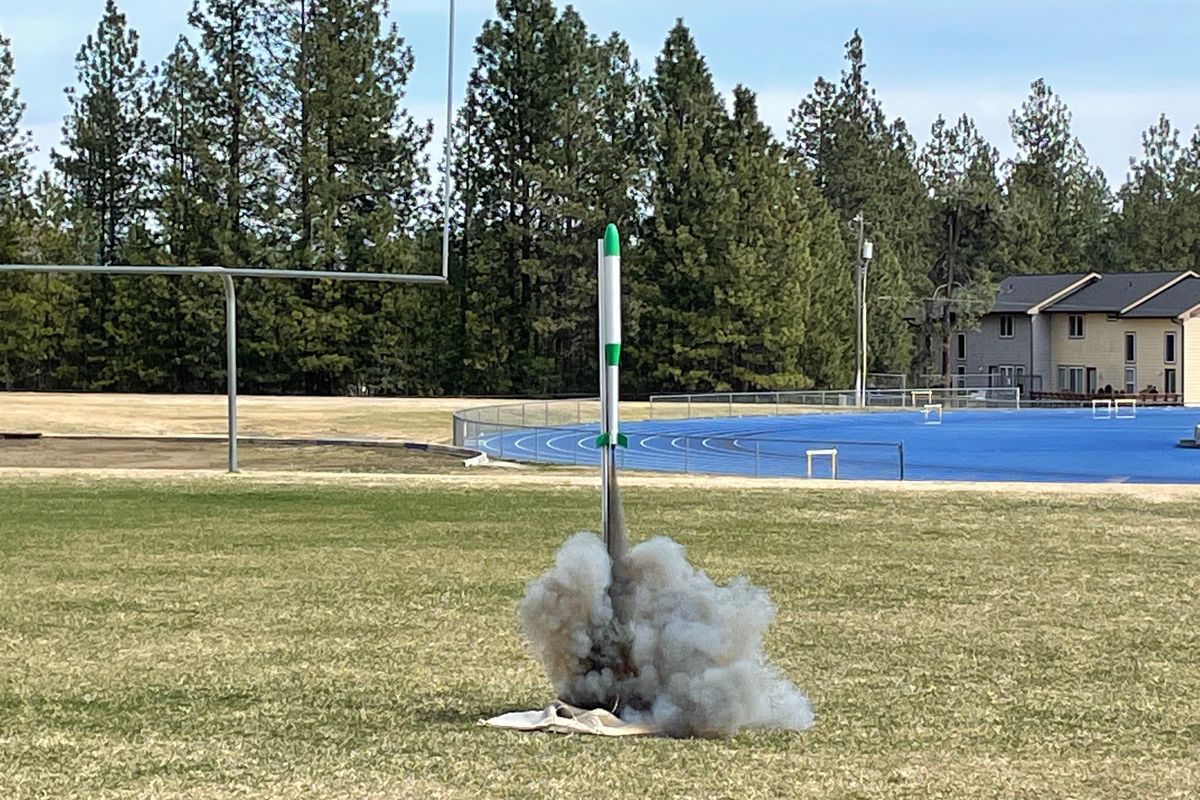Having a blast: Girl Scouts put learning to the test with rocket launches

A trio of Girl Scouts on the first team from Spokane attempting to qualify for this year’s American Rocketry Challenge ran out of time and rocket motors before they could perfect their rocket’s flight to match the needed specifications.
The partnership between the Girl Scouts and the National Association of Rocketry was formed in December. The Ferris High School students began working on their rocket in January, several months behind the other teams that started in September.
Natalie Olinger, Faith Nolander and Lillian Lincks spent their afternoon Sunday at the Mead High School soccer field firing off their rocket in multiple launches. The rocket, carrying two eggs as passengers, had to reach 835 feet and be in the air between 41 and 43 seconds to earn maximum points. Points are deducted for being too high or two low in the air or staying up too long. The team had to submit two qualifying runs in order to advance to the competition, but only managed one before running out of rocket motors.
Girls Scouts of Eastern Washington and North Idaho CEO Brian Newberry, who was at the soccer field to cheer the team on, said it has been difficult to find rocket motors. They were able to get several sizes, but only two of each size, Newberry said. That complicated the team’s efforts to find the right combination of motor, weight and parachute size and then replicate those results.
Olinger and Nolander heard about the rocketry challenge through an email blast that Newberry sent out announcing the partnership and recruited Lincks, who was friends with Nolander, to join them.
“We all like math and science and this just lends itself well,” Nolander said.
“I just really enjoy doing things like this; building things, troubleshooting, figuring out what worked and what didn’t,” Lincks said.
There had been previous test flights before Sunday. In one instance, wind and a malfunctioning motor caused the rocket to land on the roof of a nearby shed.
“My dad finally got the rocket down and then it was broken,” Lincks said.
Newberry said he’s been impressed by the work the team, that calls itself the Artemis Aces, has been doing, including computer modeling to help predict how the rocket will perform.
“It really has been a science-based project,” he said.
None of the girls had previous experience in rocketry. The team is allowed to have a mentor, but must do all the work independently. The mentor is Marty Weiser, who retired last year from teaching mechanical engineering at Eastern Washington University. He said he acts as a mentor because he likes encouraging young people to learn about science. “I’ve done mentorship for this program for a dozen years, off and on,” Weiser said.
The first test flight appeared to go well. The rocket launched without issue and landed softly without damage. The crowd of family members and observers cheered.
“They did it,” Newberry said. “The computer said it would work and it did.”
The two eggs, which the girls dubbed Eggbert and Neil Eggtrom, survived unharmed. But the flight didn’t meet the specifications.
“Either the altimeter’s wrong or it went over 1,000 feet,” Olinger said.
It had, in fact, reached 1,111 feet and was in the air 53 seconds. The team discussed whether to reduce the motor size or increase the weight before opting to add 60 grams of weight.
The second flight was better, reaching a height of 939 feet and staying up for 45.48 seconds.
“So, we need a smaller motor,” Olinger said.
Throughout the rest of the afternoon the team continued to experiment with motors, rocket weight and the size of the parachute. During one launch, an egg broke on takeoff. The team had one qualifying run, which they had to announce as a qualifying launch before the rocket took off, before running out of motors.
With Sunday’s deadline looming, another qualifying attempt was impossible. The soccer field, the only one big enough for their purpose, is only available on Sundays and two team members are set to be out of town .
“We would have to get more motors and we don’t have time,” said Michele Dailey, Olinger’s mother. “We just ran out of time.”
But the team is committed to taking what they’ve learned into next year’s competition and they hope they’ll have company.
“I hope that after our success other Girls Scouts will get interested,” Nolander said.